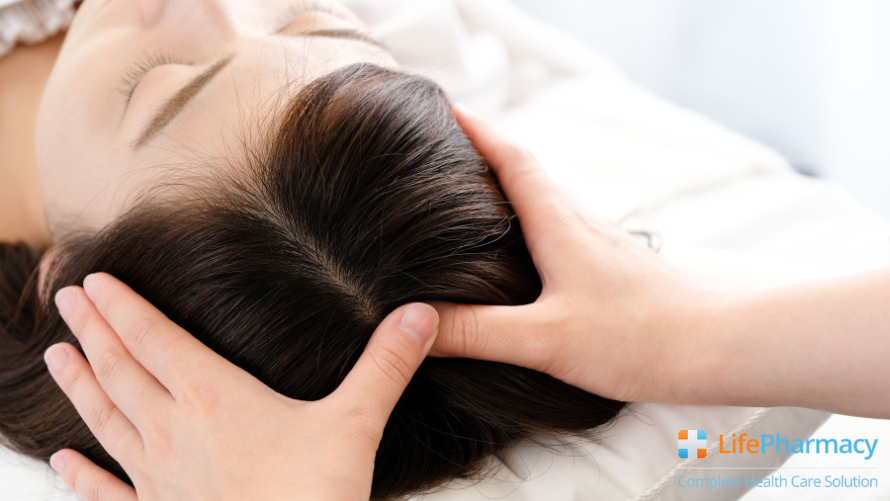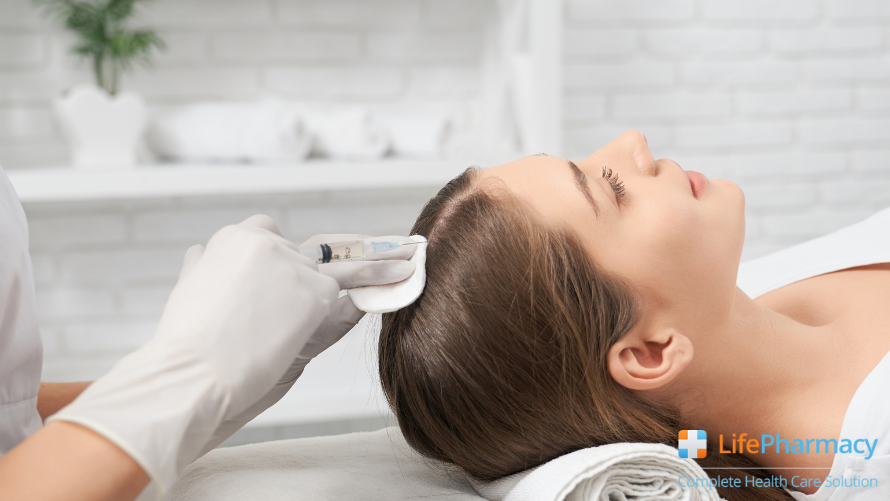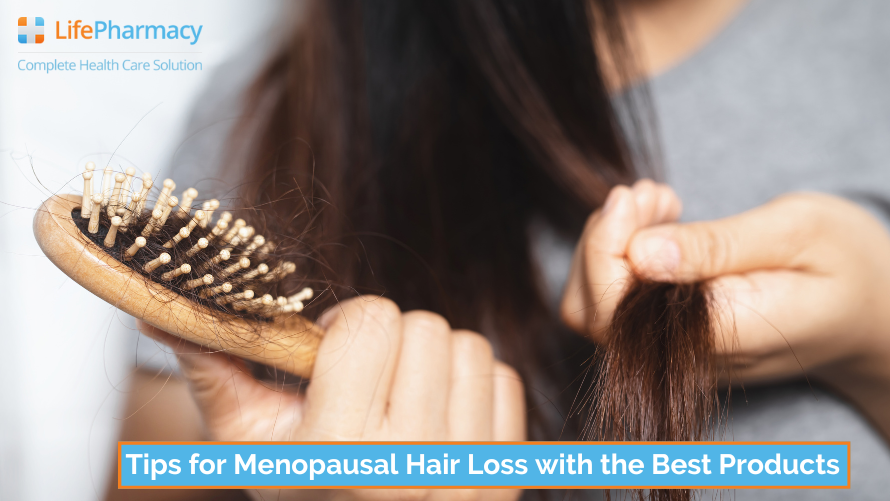The decrease in estrogen during menopause can lead to thinner, slower-growing hair or increased shedding. This condition commonly begins during perimenopause and may persist into post-menopause. Embracing a holistic approach that includes understanding hormonal impacts and selecting appropriate products for hair loss can significantly reduce thinning hair due to menopause, boosting confidence during this transitional period.
Online Pharmacy recommends recognizing the signs early and seeking proper diagnosis is crucial to stopping hair loss and stimulating growth. Read further to know everything relating to Menopausal Hair Loss.
Menopause and Hair Loss Explained
What Are the Causes of Hair Loss in Menopause?
Hormonal imbalances are a key factor in menopause-related hair loss, which can happen during any stage of menopause:
-
Perimenopause (the years leading up to menopause)
-
Menopause (marked by 12 months without a period)
-
Post-menopause (the years following menopause)
While factors like genetics, stress, diet, and certain health conditions also play a role, hormonal changes during menopause are a primary cause of hair loss in women. The severity of hair shedding varies among women, with some experiencing minimal impact while others may see dramatic short-term shedding or even persistent hair loss.
Oestrogen, which is beneficial for hair, prolongs the anagen (growth) phase and combats the negative effects of androgens(male hormones) on hair follicles. While testosterone can promote body hair growth, it can inhibit scalp hair growth. Estrogen encourages scalp hair growth and reduces testosterone levels by converting it into estrogen, while progesterone limits testosterone production and its conversion to DHT, a derivative that influences hair follicles.
The significant reduction in estrogen and progesterone leading to a relative increase in testosterone during menopause, which can occur suddenly or gradually, can cause excessive hair shedding and the emergence of thinner and shorter hairs during menopause.
What Are The Effects of Menopausal Hair Loss on Women?
Menopausal hair loss can significantly impact women both physically and psychologically. The changes range from thinning hair to the emergence of hair in new, often unexpected areas, with each woman experiencing these changes uniquely.
This can lead to feelings of low self-esteem and confidence. It might result in avoiding social interactions and experiencing anxiety, which can be profoundly distressing.
When to Consult a Healthcare Professional?
Experiencing hair loss is a sign of consultation with a healthcare provider to check if menopause is the culprit or other underlying conditions are at play. Conditions such as Adrenal insufficiency, Anemia, Nutritional deficiencies, Medication side effects, Psoriasis of the scalp, Stress, Syphilis, and Thyroid disease can also trigger hair loss. They should be excluded during the diagnostic phase. Addressing these concerns can pave the way for targeted treatment and prevent hair loss.
How To Diagnose Menopause-Related Hair Loss Symptoms?
Identifying whether hair loss is due to menopause involves observing specific symptoms. Menopause-induced hair thinning typically develops gradually over several years. This is distinct from hair loss caused by acute stress, which appears suddenly, often within two to three months following a stressful incident. Also, rapid hair loss or scalp irritation suggests other underlying issues.
Should you notice significant hair thinning, consult a primary care provider or a skin specialist. To pinpoint the cause of hair loss, your healthcare provider might conduct blood tests to identify any nutritional shortages. Deficiencies in vitamins such as B12, folate, biotin, and riboflavin are known to contribute to hair loss. If tests show normal levels of these vitamins, one can generally exclude nutrient deficiencies as the cause.
Next, specific blood tests may also be conducted to evaluate various hormone levels, including Androstenedione, DHEA, Follicular stimulating hormone (FSH), Luteinizing hormone, Prolactin, and Testosterone.
Lastly, a scalp biopsy could be performed. This procedure helps to check if menopausal hormonal fluctuations are leading to the shrinkage of hair follicles, a common cause of hair loss.
How To Prevent Menopausal Hair Loss?

1. Get Going
Embracing an active lifestyle can help you navigate menopause easily, as it is vital for overall well-being and managing stress effectively. Stress can lead to decreased estrogen, which can worsen hair thinning. Activities like yoga and breathing exercises are highly recommended for their ability to manage menopausal symptoms. Regular physical activities, like dancing, walking, and cycling, are also beneficial to maintain heart health after menopause.
2. Right Products
When selecting hair care products such as conditioners, serums, or shampoos for thinning hair, it's important to look for ingredients that support hair rejuvenation and growth. Essential ingredients include Biotin, Keratin, Ginseng, and Jojoba Oil, each known for their beneficial properties in hair care. Products should be free from harsh chemicals to avoid further damage to the hair and scalp.
3. Nutritional Wisdom
A diet low in fats and rich in whole grains, fruits, and vegetables can support hair health. Incorporating green tea, B6, folic acid, and essential fatty acids from foods like leafy vegetables, almond salmon, eggs, and spinach can further enhance hair growth and strength.
4. Hydration Power
Staying hydrated is fundamental for health and well-being. It's recommended to drink a minimum of 8-ounce glasses of water per day, including purified water while avoiding sugary drinks.
5. Gentle Hair Care
Treating your hair gently and avoiding heat tools and harsh styling techniques are important. Natural dyes are preferable to chemical ones as they are good for menopausal hair. To avoid breakage, one must brush and style one's hair without tangling it.
6. Adequate Sleep
Lack of sleep can affect hormonal balance linked to hair loss. Aim for 7-8 hours nightly.
7. Scalp Massages
Stimulate blood flow with gentle scalp massages, possibly using essential oils for added relaxation.
8. Medication Review
If you suspect that your ongoing medication is contributing to hair loss, consult with your doctor for possible alternatives.
What Are The Treatments for Menopausal Hair Loss?

Navigating menopausal changes requires a multifaceted approach, especially when addressing hair loss.
1. Hormone Replacement Therapy (HRT)
HRT can be crucial in decreasing various menopausal symptoms, including hair loss, by potentially stabilizing hair follicle function.
2. Microneedling
Microneedling is a procedure that involves creating tiny punctures in the scalp with fine needles to induce a healing response that can stimulate hair follicle growth. When combined with topical treatments like Minoxidil, microneedling may enhance absorption and effectiveness, potentially leading to improved hair growth outcomes.
3. Low-Level Laser Therapy
Laser therapy, particularly low-level laser therapy (LLLT) uses non-invasive light technology to foster hair density and thickness,
4. Hair Transplant
For women experiencing significant hair loss during menopause, a hair transplant offers an apt solution. This surgical technique involves transferring hair from denser areas of your scalp or body to the thinning or bald sections, commonly focusing on the head's back as the donor site.
5. Regaine
Regaine For Women, a widely recognized brand of Minoxidil, is a non-prescription treatment that stimulates hair follicles and improves blood flow, encouraging hair growth. Consistency and patience are key, as results may take months to become noticeable. It's important to note that stopping the treatment could result in losing any hair gained. Pharmacy online is ready with their supplies of this remedy to help you win over your hair loss battle.
6. Alpecin
Alpecin Liquid, known for its caffeine-based formulas, aims to energize hair follicles, potentially reducing hair loss caused by menopausal changes. While not a prescription treatment, Alpecin liquid is designed to support hair health, making it an accessible option for those exploring non-medical treatments.
7. Nutritional Supplements
Supplements can address potential nutritional deficiencies that may contribute to hair loss. The vitamins shop contains vitamins and minerals that can stimulate hair growth.
8. Medication
Medications like Minoxidil (Rogaine), Finasteride (Propecia), and Spironolactone have been identified as effective treatments for hair loss, particularly for women going through menopause. Each of these medications interacts differently with the body's hormonal balance to prevent female pattern hair loss.
Are you looking for OTC treatments for menopausal hair loss?
Life Pharmacy has a full range of supplements and topical treatments to prevent hair loss.
How To Maximize Hair Growth Effectiveness?
For optimal results from new hair growth treatments, consider the following guidelines:
-
Missing applications can delay results. Adhere strictly to the product's directions.
-
Use topical solutions and dietary supplements for a comprehensive approach.
-
Add new products one at a time to identify what works best easily.
-
Be patient for results as improvements may take up to three months as hair growth cycles renew.
LIFE PHARMACY: Your Partner In Preventing Menopausal Hair Loss
Life Pharmacy aims to inform you about effective menopausal hair loss remedies available. The diversity of treatments, from HRT to innovative options like microneedling, personal health history, the severity of hair loss, and individual menopausal experiences should guide treatment choices. Consulting with healthcare professionals specializing in menopausal health ensures a tailored, effective approach to managing hair loss.
We offer a variety of proven hair care solutions tailored to every woman's needs, supporting you in regaining fuller, healthier hair. Contact us to embark on your journey to revitalize hair.






